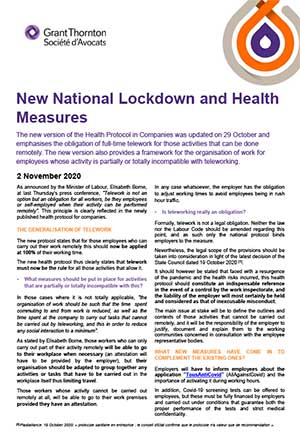-
Tax Policy Management
Tax Policy Management
-
Growth Management
Growth Management
-
Tax audit and litigation
Tax audit and litigation

-
Definition of a strategic and secure transfer pricing structure
Definition of a strategic and secure transfer pricing structure
-
Assistance in the development of international activities and operational reorganisations – “Business restructuring”
Assistance in the development of international activities and operational reorganisations – “Business restructuring”
-
Defense of practices and assistance in the context of tax audits and their follow-up from a litigation viewpoint
Defense of practices and assistance in the context of tax audits and their follow-up from a litigation viewpoint
-
Annual declaration and documentation obligations
Annual declaration and documentation obligations

-
Domestic and international VAT applicable to your company's flow
Domestic and international VAT applicable to your company's flow
-
Banking and financial VAT, VAT in the insurance sector
Banking and financial VAT, VAT in the insurance sector
-
VAT related to real estate registration fees
VAT related to real estate registration fees
-
VAT in the public and non-profit / association sector
VAT in the public and non-profit / association sector
-
Tax audit, tax litigation and relations with the Tax authorities
Tax audit, tax litigation and relations with the Tax authorities
-
Applicable rules for invoicing
Applicable rules for invoicing
-
Customs issues related to your company's international flows
Customs issues related to your company's international flows
-
French VAT registration and compliance obligations
French VAT registration and compliance obligations
-
Payroll tax
Payroll tax
-
Other indirect taxation
Other indirect taxation

-
Company transfer diagnosis
Company transfer diagnosis

-
Distribution strategy : Implementing and structuring
Distribution strategy : Implementing and structuring
-
Distribution activities digitalisation
Distribution activities digitalisation
-
Relations between suppliers and distributors
Relations between suppliers and distributors
-
Contractual policy : etablishing and structuring
Contractual policy : etablishing and structuring
-
Controls and litigation regarding payment terms
Controls and litigation regarding payment terms
-
Organising and securing commercial relations with consumers
Organising and securing commercial relations with consumers
-
Data protection - GDPR
Data protection - GDPR
-
Commercial Leases
Support in the management and contract management of commercial leases.

-
Traditional Services offered
Traditional Services offered
-
Health at work and quality of life at work
Health at work and quality of life at work
-
HR Management Audit
HR Management Audit
-
HR Engineering and People Change
Implementing managerial solutions in line with the company's strategic challenges
-
Management of HR compliance and internal investigations (harassment, discrimination, and whistleblowing)
Management of HR compliance and internal investigations (harassment, discrimination, and whistleblowing)

-
Advice on legal structuring
Advice on legal structuring
-
Day to day company management
Day to day company management
-
Companies reorganisation
Companies reorganisation
-
Mergers & Acquisitions - Private Equity
Mergers & Acquisitions - Private Equity
-
Changes in shareholder structure - Securities issue
Changes in shareholder structure - Securities issue
-
Governance and legal risks management
Governance and legal risks management

-
Development of an international mobility policy
Development of an international mobility policy
-
Coordination of reporting obligations for employees in a mobility situation
Coordination of reporting obligations for employees in a mobility situation
-
Advice on social security
Advice on social security
-
Assistance in labour law
Assistance in labour law

-
Management and protection of your portfolio of property rights
We put the most appropriate protection policy in place for our clients’ intellectual property rights.
-
Securing your projects: advisory and drafting of agreement services
We advise you on the feasibility of your project and the securing of your intellectual property and IT rights.
-
Enforcement of your rights: pre-litigation and litigation
Enforcement of your rights: detection of infringement, pre-litigation and litigation

The new version of the Health Protocol was updated on 29 October.
The new version of the Health Protocol in Companies was updated on 29 October and emphasizes the obligation of full-time telework for those activities that can be done remotely. The new version also provides a framework for the organization of work for employees whose activity is partially or totally incompatible with teleworking.
As announced by the Minister of Labour, Elisabeth Borne, at last Thursday's press conference, “Telework is not an option but an obligation for all workers, be they employees or self-employed when their activity can be performed remotely”. This principle is clearly reflected in the newly published health protocol for companies.
THE GENERALISATION OF TELEWORK
The new protocol states that for those employees who can carry out their work remotely this should now be applied at 100% of their working time.
The new health protocol thus clearly states that telework must now be the rule for all those activities that allow it.
- What measures should be put in place for activities that are partially or totally incompatible with this?
In those cases where it is not totally applicable, “the organisation of work should be such that the time spent commuting to and from work is reduced, as well as the time spent at the company to carry out tasks that cannot be carried out by teleworking, and this in order to reduce any social interaction to a minimum”.
As stated by Elisabeth Borne, those workers who can only carry out part of their activity remotely will be able to go to their workplace when necessary (an attestation will have to be provided by the employer), but their organisation should be adapted to group together any activities or tasks that have to be carried out in the workplace itself thus limiting travel.
Those workers whose activity cannot be carried out remotely at all, will be able to go to their work premises provided they have an attestation.
In any case whatsoever, the employer has the obligation to adjust working times to avoid employees being in rush hour traffic.
- Is teleworking really an obligation?
Formally, telework is not a legal obligation. Neither the law nor the Labour Code should be amended regarding this point, and as such only the national protocol binds employers to the measure.
Nevertheless, the legal scope of the provisions should be taken into consideration in light of the latest decision of the State Council dated 19 October 2020 [1].
It should however be stated that faced with a resurgence of the pandemic and the health risks incurred, this health protocol should constitute an indispensable reference in the event of a control by the work inspectorate, and the liability of the employer will most certainly be held and considered as that of inexcusable misconduct.
The main issue at stake will be to define the outlines and contexts of those activities that cannot be carried out remotely, and it will be the responsibility of the employer to justify, document and explain them to the working communities concerned in consultation with the employee representative bodies.
WHAT NEW MEASURES HAVE COME IN TO COMPLEMENT THE EXISTING ONES?
Employers will have to inform employees about the application “TousAntiCovid” (AllAgainstCovid) and the importance of activating it during working hours.
In addition, Covid-19 screening tests can be offered to employees, but these must be fully financed by employers and carried out under conditions that guarantee both the proper performance of the tests and strict medical confidentiality.
O OTHER THAN THE MEASURES PROVIDED FOR IN THE PROTOCOL, WHICH SECTORS WILL BE ABLE TO CONTINUE TO OPERATE IN THE CONTEXT OF THIS NEW LOCKDOWN?
As detailed by the French Government on its website, “All establishments which are essential to the life of the Nation, and in particular closed or open food markets and food shops (including food drive-throughs), pharmacies, service stations, banks, tobacconists and press distribution” will be able to continue their activity, as was the case during the first lockdown.
The list has nevertheless been extended compared to last spring. As an example, the following activities may continue to operate as usual.
- Maintenance and servicing, repairs, equipment and technical tests of motor vehicles, agricultural vehicles and machinery and equipment, motorbikes and bicycles;
- Retail sale of frozen foods and general food, convenience stores, supermarkets, hypermarkets, and retail sale in specialised food shops;
- Retail sale of IT, communication, telecommunications and computer equipment, as well as repair outlets for such equipment and materials;
- Retail sale of building and DIY materials, hardware, paints and glass in specialised shops;
- Retail sale of pharmaceutical products in specialised shops;
- Rental and leasing of motor vehicles, other machinery, goods and equipment, agricultural machinery and equipment, construction machinery and equipment;
- Financial and insurance activities;
- Wholesale trade;
- Interim and labour employment agencies;
- Tourist and other short-stay accommodation where this constitutes a regular place of residence for the persons living there;
- Personal and care services at home;
- Transport services;
This list is likely to change as the President of the Republic has suggested that fortnightly reassessments of the situation may occur.
For other businesses, all delivery or order collection activities can be maintained.
Moreover, unlike the March confinement, the construction and public works sector, as well as factories and farming activities can continue to operate.
Post offices and public service offices remain open. Court hearings are expected to continue during the lockdown as well.
***
Grant Thornton Société d’Avocats remains at your disposal for any further information you may require.
[1] Plastalliance. 19 October 2020 : « protocole sanitaire en entreprise : le conseil d’Etat confirme que le protocole n’a valeur que de recommandation ».
Authors-Contacts: Cécile Didolot, Director Attorney-at-law (cdidolot@avocats-gt.com), Caroline Luche-Rocchia), Partner Attorney-at-law (CLuche-Rocchia@avocats-gt.com) and Islem Berkani, Attorney-at-law(IBerkani@avocats-gt.com)













